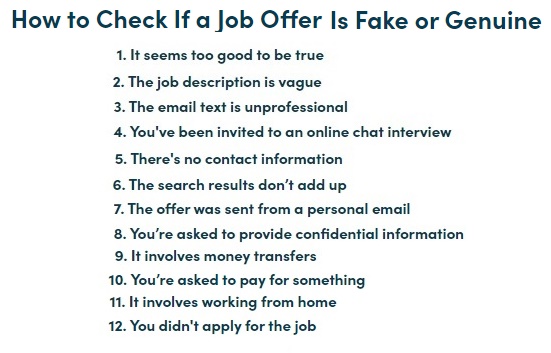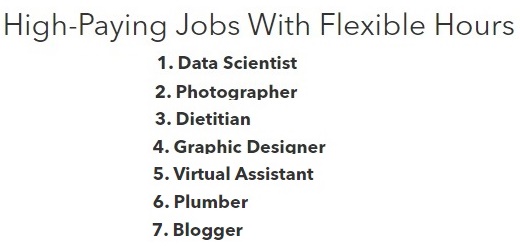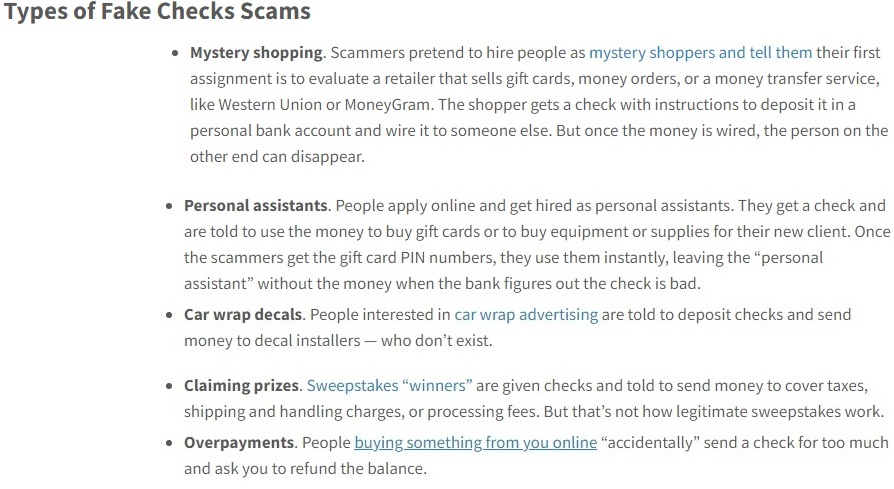Job Offer Scams
✔ Fake Offer Letters from Big Companies
If you are looking for a new or part-time job online and posting your resume everywhere, this can unintentionally lead you to a scammer. Many people face job offer scams because of these simple mistakes. Even these small mistakes can create big problems in their lives. For example, if you apply for a job online without knowing anything about the company, or upload your resume on any random website or social media platform, fraudsters may notice you and understand exactly what you’re looking for.
They will then target you and try to pull you into a scam. The first thing they usually do is call you, claiming to be from a big and well-known company. Once you hear the name, you get excited and start imagining the job. With this imagination, you begin to trust them without asking questions. This is how fraudsters attract and deceive you. They slowly trap you with fake promises. A person who doesn't stay cautious or in control will easily fall for their words and end up in a scam.

Once you accept the job offer, the fraudulent employer may also send you fake information. The recruiter, just for formality, might ask a few questions about your resume, but they have no real intention of offering you a job. They will use cheerful and inspiring words to convince you that you’ve been selected for the role, but in reality, they won't offer you a legitimate position. After some time, they may ask for a relocation fee, registration fee, or even an installment bonus.
They might also offer a salary that is far more than you expected. Hearing this, you may feel that it’s the perfect job opportunity. But fraudsters are smart — they don’t give you time to think, verify, or discuss the details. They push for a fast hiring process. Sometimes, you might even receive a call letter for an interview or an offer letter without ever applying for the position. This should be a warning sign for you.

Some people feel very excited when they receive an offer letter from a well-known company and are eager to attend the interview or accept the offer. However, this is again a warning sign. Unfortunately, the scammer’s words may impress you so much that you end up accepting the offer, believing you’ve landed your dream job. Furthermore, the scammer may issue you an immediate offer letter to work for the company — but you will not be able to contact the company directly, which is undoubtedly a scam.
Fake offer letters from reputable companies are a cunning form of job scam, designed to deceive and exploit job seekers. Crafted with precision, these fraudulent documents often bear the logos, signatures, and contact details of well-known organizations, giving them an air of authenticity. They promise lucrative positions, competitive salaries, and attractive benefits, luring individuals into a false sense of security.
Once a victim is hooked, the scam can take various turns. Some scammers request personal information — such as Social Security numbers, bank account details, or copies of identification — under the pretense of completing the hiring process. In more aggressive cases, scammers may demand upfront payments for processing fees, background checks, or other fabricated expenses.
✔ Flexible work with high pay
If the job offer mentions a high income level for a lower position, this is a major warning sign. For example, a fresher is typically offered a minimum salary of around 35,000 rupees per month. However, fraudsters may offer a salary of 75,000 rupees per month for the same entry-level role. Offering such high salaries for beginner positions is definitely a red flag and a clear sign of a scam.
If you receive such information on a job portal, take a moment to carefully review the company's description before applying. While there are many genuine career opportunities available with excellent working environments, it’s important to stay alert and verify the legitimacy of every offer.

You may find job offers that provide flexible working hours and promote a healthy work-life balance. However, if a job offer seems a little too flexible, it could be a major warning sign. A position that offers unusually high pay along with an unconventional schedule is also a potential red flag.
For instance, a fraudulent employer may promise that you’ll only need to work two or three days a week and still earn a high income. If the recruiter confirms your salary before you even send your resume, that is a clear indication of a scam.
Job seekers should exercise caution when encountering offers for flexible work with exceptionally high pay, as these are often red flags for potential scams. Scammers frequently use tempting promises of flexible schedules and attractive earnings to lure individuals seeking remote or part-time roles.
To avoid falling victim to such schemes, individuals should research the company thoroughly, verify the authenticity of the job posting, and remain skeptical of offers that seem too good to be true. Legitimate employers typically follow standard hiring procedures, and job seekers should never be asked to pay any fees upfront for employment. Staying informed, trusting your instincts, and conducting proper due diligence are essential steps to distinguish genuine job opportunities from fraudulent ones.
✔ Payments Before Pay checks
Still, there are many things you need to clarify before accepting a job offer. Some companies may even request payment from you in order to send the offer letter. Be cautious of any company or recruiter that asks for money. If the company or employer is truly legitimate, they will never ask you for payment. The job position could be anything and anywhere, but you should never agree to pay for an interview or accept a job that requires upfront fees.
Scammers may also tell you that you can start working in your dream location after a short waiting period. Many candidates get excited and start imagining life in their favorite city. These deceptive promises manipulate the human mind and make people agree without question.
Some fraudulent companies also ask candidates to sign contracts. For example, they might promise that during the first three months, your salary will be ₹15,000, and after the probation period, it will increase to ₹75,000. These unrealistic promises are often used to lure job seekers into a trap.

These words influence the candidate’s mindset, making them imagine a lavish lifestyle. As a result, candidates unexpectedly and unintentionally fall for the scammer’s words and become eager to accept the offer. This is how scammers manipulate job seekers to steal money from them. If a job offer seems even slightly unprofessional, take the time to research the company and make an informed decision. Learning more about the company can help you judge its authenticity.
Requiring payment before receiving a paycheck is a major warning sign of a potential scam. Legitimate employers never ask employees to make upfront payments as a condition of employment. Scammers often use this tactic to exploit job seekers, promising high-paying roles while requesting payments for things like training materials, background checks, or administrative fees. Job seekers should be extremely cautious if asked to pay anything before starting a job, as this is not a standard practice in genuine employment. Verifying the authenticity of the employer, researching the company thoroughly, and consulting trusted sources can help individuals identify and avoid scams that involve payment demands before employment begins.
✔ Avoid a fake check scam
In addition, you should observe everything with a calm and sound mind and pay close attention to their communication — including their promises, questions, job offer, contact details, and other information about the company. If you notice anything suspicious or find that essential company information is missing, conduct an internet search to check the company’s website or verify their email address.
If, after thorough searching, you still cannot find even basic information about the organization — such as its name, staff members, or other key details — it’s best to move on to your next opportunity. Be especially cautious if the scammer requests confidential information, like your financial details, before any formal hiring takes place.

When a company recruits new employees, it is required to collect tax documents and bank information for direct deposit — but not at the initial stage of the hiring process. This information is only mandatory after you have signed the employer's offer and officially started your job. If a recruiter asks for personal details such as your Social Security number, bank account number, or any other personal or financial information too early, it's best to decline the offer and move on to the next opportunity.
To avoid falling victim to a fake check scam, individuals should remain vigilant and follow these precautions.
First, be skeptical of unexpected checks received in the mail — especially if you weren’t expecting any funds.
Second, verify the legitimacy of the sender and the check by contacting the issuing bank directly, using contact information you find independently (not from the check or letter).
Third, avoid depositing or cashing checks if you have any doubts about their authenticity.
Fourth, be cautious if you're asked to send money or make purchases shortly after depositing a check — this is a common scam tactic. Lastly, educate yourself about common scams and warning signs related to fraudulent checks to increase your awareness and protect yourself from financial loss.


